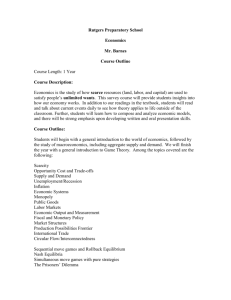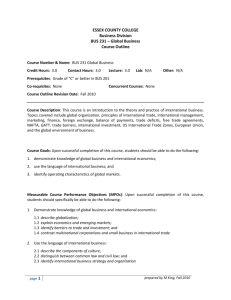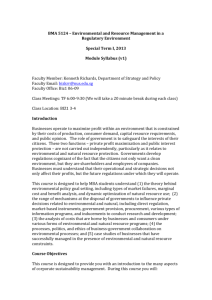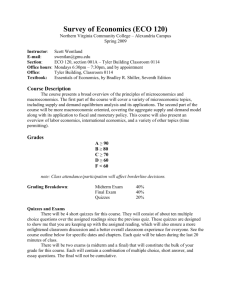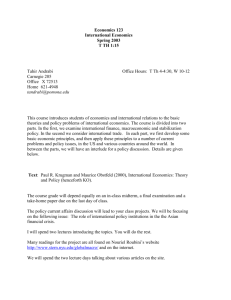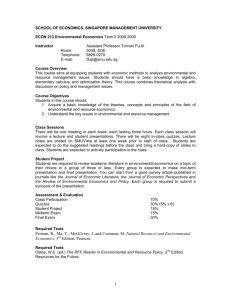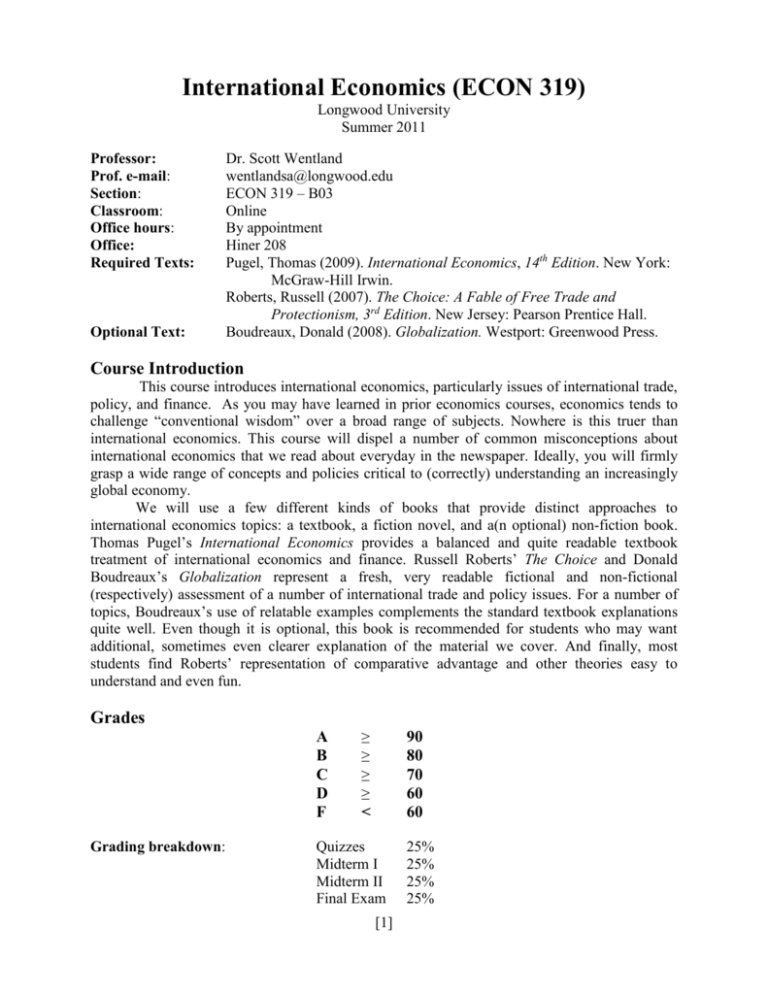
International Economics (ECON 319)
Longwood University
Summer 2011
Professor:
Prof. e-mail:
Section:
Classroom:
Office hours:
Office:
Required Texts:
Optional Text:
Dr. Scott Wentland
wentlandsa@longwood.edu
ECON 319 – B03
Online
By appointment
Hiner 208
Pugel, Thomas (2009). International Economics, 14th Edition. New York:
McGraw-Hill Irwin.
Roberts, Russell (2007). The Choice: A Fable of Free Trade and
Protectionism, 3rd Edition. New Jersey: Pearson Prentice Hall.
Boudreaux, Donald (2008). Globalization. Westport: Greenwood Press.
Course Introduction
This course introduces international economics, particularly issues of international trade,
policy, and finance. As you may have learned in prior economics courses, economics tends to
challenge “conventional wisdom” over a broad range of subjects. Nowhere is this truer than
international economics. This course will dispel a number of common misconceptions about
international economics that we read about everyday in the newspaper. Ideally, you will firmly
grasp a wide range of concepts and policies critical to (correctly) understanding an increasingly
global economy.
We will use a few different kinds of books that provide distinct approaches to
international economics topics: a textbook, a fiction novel, and a(n optional) non-fiction book.
Thomas Pugel’s International Economics provides a balanced and quite readable textbook
treatment of international economics and finance. Russell Roberts’ The Choice and Donald
Boudreaux’s Globalization represent a fresh, very readable fictional and non-fictional
(respectively) assessment of a number of international trade and policy issues. For a number of
topics, Boudreaux’s use of relatable examples complements the standard textbook explanations
quite well. Even though it is optional, this book is recommended for students who may want
additional, sometimes even clearer explanation of the material we cover. And finally, most
students find Roberts’ representation of comparative advantage and other theories easy to
understand and even fun.
Grades
A
B
C
D
F
Grading breakdown:
≥
≥
≥
≥
90
80
70
60
60
<
Quizzes
Midterm I
Midterm II
Final Exam
[1]
25%
25%
25%
25%
Quizzes
There will be 9 short quizzes for this course (8 of which will count). They will consist of
a handful of questions over the assigned readings and lecture material since the previous quiz. I
will drop your lowest quiz grade. These quizzes are designed to show me that you have read the
assigned texts and have understood the class lectures, which will ensure that everyone has
feedback on his/her understanding of the material prior to the exam. Quizzes will be
approximately 3 times per week, and there will be no make-up quizzes. See the course outline
below for specific dates.
All quizzes will be available on Blackboard on the date specified.
Midterms
The midterm exams will cover material from Part I of the course and will not be
cumulative. The first midterm will cover all readings and class notes prior Friday, July 22 and
will take place in class on July 22. The second midterm will cover all readings and class notes
since the first midterm and take place in class on Friday July 29.
Both midterms may include multiple choice, short answer, and/or essay questions. You
will have approximately 2 hours to take the exam, but keep in mind they are designed to take less
than one hour (because that is how long my normal semester exams usually take). They will be
available on Blackboard from noon to 11pm on the days of the exam specified above.
Final Exam
The final examination will primarily cover material from Part II of the course. It is not
comprehensive insofar as it will not have detailed questions specific to Part I material, but some
questions may still require a general understanding of Part I. The final will be available on
Blackboard from noon to 11pm on Friday August 5.
Course Policies
Make-up and extra credit policy: There will be no make-up quizzes given. If you have a
foreseeable conflict, then please notify me as potential arrangements can be made for you to take
the quiz or test early. I will also drop your lowest quiz. This should buffer against the occasional
unusual circumstance that may cause an unforeseen conflict, or just a bad day. I find that the
more quizzes I allow people to drop, students become sick more often. Thus, out of consideration
for your well-being, I will only allow limited quiz drops.
Also, there will be no extra credit assignments. Unhappy with their grades, many students
typically approach me near the end of the semester and ask for an extra credit assignment. I view
extra credit as unfair to those who initially put the time and effort into good grades on the
quizzes and exams. So, my advice to you is this: get your credit while it lasts!
Longwood e-mail and Blackboard: You will be required to check your Longwood University
e-mail and Blackboard on a daily basis (if you do not already do so). I will disseminate course
information using both outlets, including announcements, course content, grades, and (possibly)
class cancellations. If you have any questions or problems about accessing these, please see me
or IT Services.
[2]
Academic Dishonesty Policy: Cheating in any form will not be tolerated in the College of
Business and Economics. If the instructor determines that a student has cheated on an
assignment, the grade of “F” may be assigned for the entire course. “Cheating” is the use of
unauthorized resources and/or work of another including but not limited to homework, tests,
papers, presentations and exams. Unless specifically instructed otherwise, students are to
assume that all coursework is to be the work of the individual student alone. If a student is
unsure as to whether collaboration is permitted, the professor should be contacted in advance of
performing the work.
If you are found guilty of cheating, you will receive an F in the class. You may also have
your name forwarded to the honor board. Please do not put yourself in a position that could
result in these penalties.
Bad Weather Days: Please do not put off doing assignments until the last minute, because you
will put yourself into a situation where bad weather could affect your internet provider and
ultimately your ability to do the assignments. It will be each student’s responsibility to download
homework assignments early (when appropriate) and to identify potential backup internet
providers (like at a local library).
Other policies: Policies not explicitly stated in this syllabus are delegated to the Longwood
University student and faculty handbooks, but are subject to change at the instructor’s discretion.
These policies include, though are not limited to, Longwood’s policies regarding to disability,
plagiarism, attendance, and classroom conduct. The Longwood University Honor Code will be
enforced. A statement of this code can be found in your student handbook. If you are a student
with a disability and you need academic accommodations, please see me and contact the
Learning Center.
General Course Format
This course will include exactly the same coverage as the usual face-to-face course, but it
will have the flexibility of an online format. During the normal semester, I teach the material in a
traditional college course setting with reading assignments, lectures, quizzes, and exams. The
online course will be essentially the same thing, only you will be able to access the lectures and
quizzes when you are free to do so and in the comfort of your own home.
The course will be separated into three parts or ‘modules’ that will be available on
Blackboard. Ideally, in a given day, you will read the assigned readings for the day, then view
the lecture, and then complete the quiz. At the end of the module, you will take your exam like
you would any other class. The purpose of this course is to provide you with the same experience
as a face-to-face course, and equip you with the same knowledge, while at the same time
allowing the convenience and flexibility of taking the course during the hours that work best for
your schedule.
[3]
Course outline
*How to read this: each day below lists the topic and reading covered in class that day. Students tend to get the most
out of the lecture when they read the assignment beforehand, which I strongly recommend. Remember, all
Globalization readings below are optional (but still recommended) , but the material in the chapters listed will be
covered in corresponding lectures.
Part I – International Trade and Economic Policy
July 18 (Monday)
reading:
Introduction to Intl. Economics, Globalization, Specialization, and Trade
Globalization, Chapters 1 & 2 (p. 1-34)
July 19 (Tuesday)
Theories of International Trade (Absolute & Comparative Advantage)
(Quiz #1)
International Economics, Chapter 3 (p. 33-45)
The Choice, Chapters 1-3 (p. 1-14)
Globalization, Chapter 3 (p. 37-49)
reading:
July 20 (Wednesday) Outsourcing and ‘Jobs’ (Quiz #2)
reading:
The Choice, Chapters 4-6 (p. 15-36)
Globalization, Chapter 4 (p. 51-68)
July 21 (Thursday)
reading:
Trade Patterns (Heckscher-Olin Theory and its Implications) (Quiz #3)
International Economics, part of Chapter 4 (p. 62-65)
International Economics, Chapter 5 (p. 69-88)
July 22 (Friday)
Midterm Exam I
Weekend reading:
International Economics, part of Chapter 2 (p. 16-29)
International Economics, Chapter 8 (p.143-160)
July 25 (Monday)
reading:
Tariffs, Quotas, and Other Instruments of Protection
The Choice, Chapters 7, 8 and 9 (p. 37-59)
International Economics, Chapter 9 (p. 165-193)
July 26 (Tuesday)
reading:
Free Trade vs. Protectionism (Quiz #4)
International Economics, Chapter 10 (p. 199-224)
The Choice, Chapter 10 (p. 60-69)
Globalization, Chapter 5 (p. 69-98)
July 27 (Wednesday) Dumping, Subsidies, and Export Policy (Quiz #5)
reading:
International Economics, Chapter 11 (p. 229-256)
July 28 (Thursday)
reading:
July 29 (Friday)
Politics of Protectionism, WTO, World Bank, IMF, & Trade Agreements
(Quiz #6)
The Choice, Chapter 12, 13, and 14 (p. 79-108)
Globalization, Chapter 7 & 8 (p. 117-147)
Midterm Exam II
[4]
Part II – International Finance and Exchange Rates
Weekend reading:
International Economics, Chapter 16 (p. 381-395)
August 1 (Monday)
reading:
Balance of Payments & the Trade Deficit/Surplus Impact
The Choice, Chapter 11 (p. 70-78)
Globalization, Chapter 6 (p. 99-116)
August 2 (Tuesday)
Foreign Exchange Market and Covered vs. Uncovered Interest Parity
(Quiz #7)
International Economics, part of Chapter 17 (p. 399-412)
International Economics, Chapter 18 (p.415-437)
reading:
August 3 (Wednesday) Exchange Rate Determination in the Short-Run and the Long-Run
(Quiz #8)
reading:
International Economics, Chapter 19 (p. 441-467)
August 4 (Thursday) Government Policy and Currency Markets and Financial Crises (Quiz #9)
reading:
International Economics, Chapter 20 (p. 473-505)
International Economics, Chapter 21 (p. 511-539)
The Choice, Chapter 15 & 16 (p. 109-116)
Globalization, Chapter 8 (p. 139 – 148)
August 5 (Friday)
Final Exam
[5]

